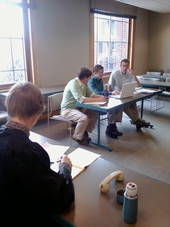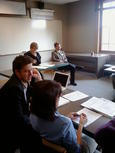Highlight
ISG 5010 collaborative learning of risk analysis
Achievement/Results
Our NSF-funded Integrative Graduate Education and Research Traineeship (IGERT) program on Risk Analysis for Introduced Species and Genotypes (ISG) links research to applications of ecological risk analysis. Our curriculum gives students foundational knowledge and skills in risk analysis but also focuses on solving contemporary problems associated with invasive species and genetically engineering organisms. Because these problems are fundamentally complex and often require multidisciplinary input, our curriculum emphasizes cooperative learning, team projects and real-world problem solving.
This year University of Minnesota ISG-IGERT faculty developed and taught a new course (ISG 5010) that provided students with real-world cases as a venue for learning to conduct all components of ecological risk assessment (ERA) for both the introduction of novel species and genotypes and the control of invasive species. Four teams of four faculty each presented modules covering the main components of ERA: Problem Identification, Exposure and Effects Analysis, Risk Characterization, and Risk Management. Each module contained at least 1 case that was carried through several sessions and collaborative learning was emphasized; assignments were team based. Cases included a role play to identify problems and get stakeholder input on the use of genetically modified mosquitoes and a complex case representing ranchers, park managers and seed producers to assess risks associated with crop that is now invading grazing land. A fifth team tied each of the modules together with a case based on a USDA AHPHIS analysis to consider the importation of Argentine citrus into the US. That case was carried out through the semester at the end of each module and concluded with a mock trial based on an actual court case that ruled against the USDA decision. At the end of the semester students discussed key issues in ERA with four of our external partners in Australia via web conferencing.
Several external partners also participated directly in the course. Dr. Eliana Fontes of Embrapa in Brazil participated in our problem formulation module, sharing her experience with a similar process that was used for genetically modified crops in Brazil, and Dr. Luke Skinner, Director of the Minnesota Department of Natural Resources Invasive Species program provided a valuable critique of the student’s risk management plan for an invasive species in a local lake. Students learned how to conduct ERA and work in teams and were also exposed to the range of views and expertise presented by the 20 participating faculty. Our faculty are now refining these cases for publication and use by our partners, other agencies and faculty elsewhere.
The NSF-funded University of Minnesota Risk Analysis for Introduced Species and Genotypes IGERT comprises a diverse group of faculty and external partners led by Ray Newman, David Andow, Susan Galatowitsch, Anne Kapuscinski and Ruth Shaw.
Address Goals
ISG 5010 emphasized collaborative learning which is an innovation in public participation theory and practice. It is designed to address the complexity and controversy inherent in protection and management of natural resources (for an illustration see ERA photo) by combining elements of systems methods and mediation/dispute management. Collaborative learning activities put more emphasis on experiential learning theory, systemic improvement, and constructive discourse than do typical lecture-style approaches.
Trainees experienced, through role-play activities, a variety of stakeholder perspectives and learned both the value and challenges associated with inclusive decision-making processes. At least 2 of our Trainees (Dana and Sharpe) are directly applying the knowledge and skills they learned in 5010 to their own dissertation research. Both Trainees work to implement decision-making processes within controversial management contexts in which funding, resource protection and unknown consequences of management decisions play important roles. Having experienced ERA from a stakeholder perspective, Trainees have a new appreciation for the imperfect application of ERA in real-world settings. Trainees transitioned from 5010 to ISG 8001 (ERA seminar) in which they heard from six practitioners of various risk assessment models. Trainee experience in 5010 provided them with a sense of the struggle within which these practitioners and managers implement the ERA process.
The study of ERA theory and application was not limited to the United States. Because we invested in advanced communication infrastructure, Trainees interacted with our international partners from the Commonwealth Scientific and Industrial Research Organisation, the University of Melbourne and others.








